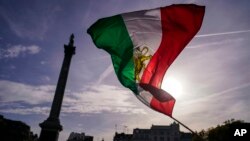Iran on Monday blasted Britain's "non-constructive role" a day after the Islamic republic announced the arrest of a U.K.-linked "network" involved in the three months of protests sparked by Mahsa Amini's death.
Protests have gripped Iran since the September 16 death of Iranian Kurdish Amini, 22, after her arrest in Tehran for an alleged breach of the country's strict dress code for women.
Tehran generally calls the protests "riots" and accuses its foreign foes, including Britain, of stoking the unrest.
State news agency IRNA reported Sunday the Islamic Revolutionary Guard Corps in the country's south had arrested seven people, including dual nationals, who had operated "under the direct guidance of elements from Britain."
Asked about their arrest during a Monday news conference, foreign ministry spokesman Nasser Kanani said, "some countries, especially [Britain], had a non-constructive role in relation to the recent developments in Iran."
"Their role was quite provocative in inciting extremism and riots," Kanani said of the foreign nations.
The group, which IRNA described as an "organized network," had been "leading subversive conspiracies, especially during the recent riots," the report quoted a Guard statement as saying.
The seven arrested in Kerman province "have been involved in planning, leading and producing content as well as field actions in the recent riots," it added.
Some of them are "dual nationals who were trying to escape from the country," the statement said without elaborating.
Iran's judiciary said last month that 40 foreigners, including dual nationals, had been arrested in the unrest.
The foreign ministry's Kanani said Monday that "during the recent riots, several citizens of European countries have been arrested with varying degrees of involvement in the riots."
"Consular and political information has been given to their respective countries," he added. "The role of the citizens of a certain number of countries, especially European and western European countries ... is quite clear and proved."
A number of Westerners, including dual nationals, had already been in custody in Iran before the protests broke out in September.
Western governments have accused Tehran of employing a "hostage-taking" policy aimed at extracting concessions or securing the release of Iranians held abroad.










